Kazakhstan protests: what is happening in Almaty, who is protesting and why has internet access been cut?
This article contains affiliate links. We may earn a small commission on items purchased through this article, but that does not affect our editorial judgement.
and live on Freeview channel 276
Kazakhstan is currently facing widespread demonstrations across the country with violent clashes between rioters and police.
A hike in fuel prices caused the riots to erupt on Sunday 2 January in the west of Kazakhstan.
Advertisement
Hide AdAdvertisement
Hide AdA state of emergency has been declared in the capital, Almaty and in the oil-rich western province Mangistau which still remains in place.
An internet blackout occurred nationwide on Wednesday 5 January, but has since returned to the capital following the five day outage.
President Kassym-Jomart Tokayev accepted his government’s resignation and took over as head of the Security Council from former leader Nursultan Nazarbayev - the former president who resigned in 2019 but still holds much power and influence.
What is happening in Kazakhstan?
The demonstrations began on Sunday before spreading quickly across the country.
Advertisement
Hide AdAdvertisement
Hide AdOn Tuesday 4 January police in Almaty used tear gas and stun grenades to deter hundreds of protesters out of the main square which saw violent clashes between the demonstrators and police.
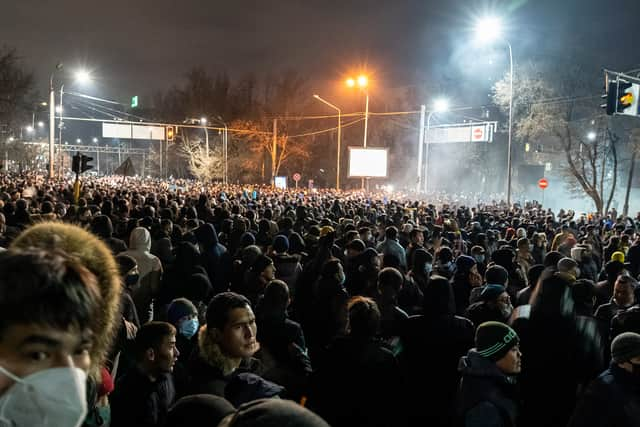

Internet services in the country were disrupted and the next day monitoring group NetBlocks reported Kazakhstan was “in the midst of a nation-scale blackout”.
The internet blackout lasted five days and services have now returned to the largest city in the country.
On Wednesday 5 January, President Tokayev accepted his government’s resignation, ordering the prices of fuel to be regulated which had caused the demonstrations.
Advertisement
Hide AdAdvertisement
Hide AdHowever, demonstrators stormed into the mayor’s office of Almaty hours after armed with clubs and metal bars.
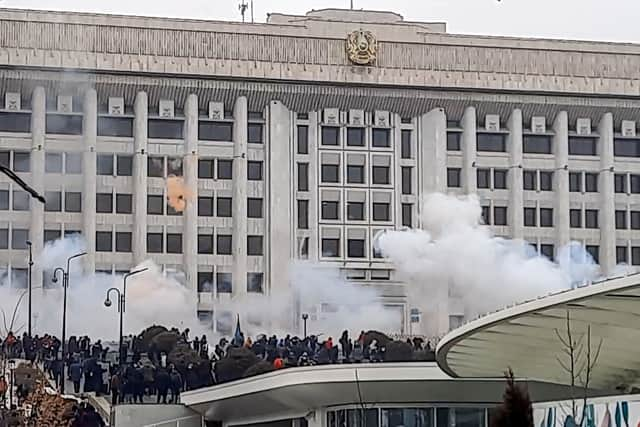

Gunfire and explosions were heard through the city centre.
The president’s residency in Almaty, where thousands of demonstrators are located, was engulfed in flames according to Russia’s Tass news.
Police were joined by the army and National Guard units in an attempt to bring order to the city.
An Instagram live stream by a Kazakh blogger showed gunshots and the mayor’s office burning.
Advertisement
Hide AdAdvertisement
Hide AdThis followed three states of emergency declared in the country, where a lot of the rich oil reserves are extracted, including a curfew, restrictions on movement and bans on mass gathering.
Mr. Tokayev addressed the country on TV promising to respond to the demonstrations with “maximum toughness”.
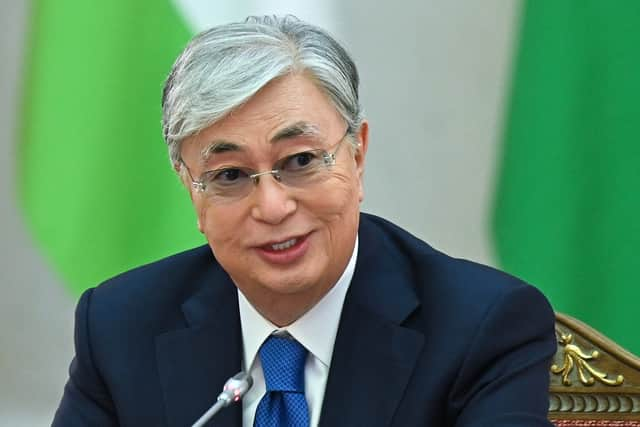

Last week, troops from countries including Russia were sent to Kazakhstan to help bring order and stability to the country.
Almost 8,000 people have been detained throughout Kazakhstan, the Interior Ministry said on Monday 10 January.
Advertisement
Hide AdAdvertisement
Hide AdThe situation is now stabilised with troops continuing “cleanup” operations and guarding “strategic facilities”, according to a presidential statement.
On Tuesday 11 January Mr Tokayev said a “phased withdrawal” of the foreign armed would begin in the following days and be completed in “no more than 10 days.”
Why did the protests start and who is protesting?
The demonstrations began after the cap on energy price was removed, causing the cost of liquified petroleum gas to double for Kazakhs. Many use this gas to power their cars.
The government justified this change by saying the previous price was unsustainable.
Advertisement
Hide AdAdvertisement
Hide AdThe country has recently struggled with rising price pressures and inflation in the past few years.
Although some argue the demonstrations are over more deep-rooted issues such as the authoritarian regime.
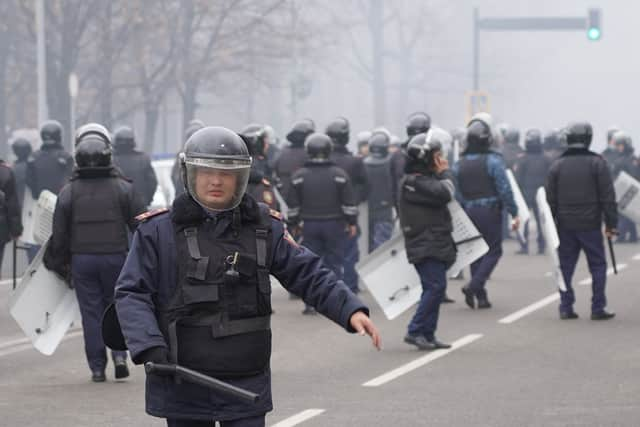

Until 2019, the state was run by President Nursultan Nazarbayev where his statues were erected across the country.
He left during anti-government protests and decided to put a close ally in his place - Kassym-Jomart Tokayev.
Advertisement
Hide AdAdvertisement
Hide AdElections in Kazakhstan are won by the ruling party after having almost 100% of the vote.
Analysts suggest the government underestimated the anger of the population and is another factor to the wide-spread demonstrations currently being witnessed.
Darkhan Sharipov, an activist from the civil society movement Wake Up, Kazakhstan, said: “We want President Tokayev to carry out real political reforms, or to go away and hold fair elections” the Guardian reported.
“Nazarbayev and his family have monopolised all sectors, from banking to roads to gas. The real cause of the protests is poor living conditions of people, high prices, joblessness, corruption,” 55-year-old Zauresh Shekenova told The Guardian in its report.
Advertisement
Hide AdAdvertisement
Hide AdAtameken, Kazakhstan’s business lobby group, reported attacks on banks, shops and restaurants.
Why has internet access been cut?
On Tuesday the country suffered “mobile internet disruptions” to severely limit coverage of the escalating anti-government protests,” internet monitoring observatory, Netblocks, said.
“The disruption is likely to limit the public’s ability to express political discontent and communicate freely,” the Netblocks report added.
On Wednesday messaging services WhatsApp, Telegram, and Signal were unavailable in Kazakhstan and the websites of two independent media outlets also appeared to be blocked.
Advertisement
Hide AdAdvertisement
Hide AdPublic gatherings in the country must receive prior permission from the authorities and are deemed illegal.
What is the background of Kazakhstan?
The country is home to large oil, gas and metal deposits and has the largest economy in the former Soviet Central Asia.
It long had political stability under the long-serving leader Nursultan Nazarbayev, who helped Kazakhstan gain independence from Moscow in 1991.
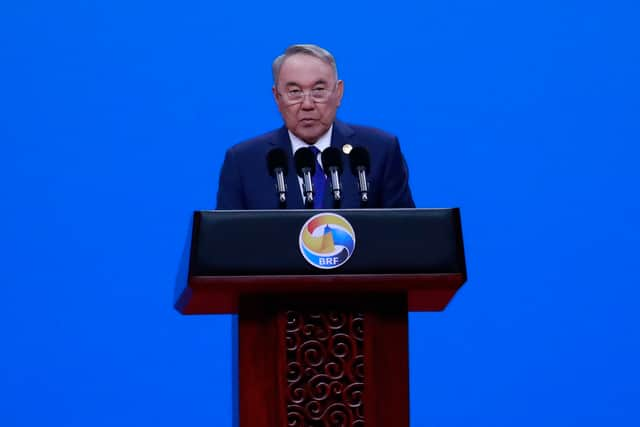

Despite stepping down and choosing his successor Tokayev in 2019, he still retained his authority as head of the powerful security council.
Advertisement
Hide AdAdvertisement
Hide AdTokayev replacing Nazarbayev in this position on Wednesday led to more demonstrations.
Human rights groups have criticised the country for its authoritarian political system and lack of free speech.
A message from the editor:
Thank you for reading. NationalWorld is a new national news brand, produced by a team of journalists, editors, video producers and designers who live and work across the UK. Find out more about who’s who in the team, and our editorial values. We want to start a community among our readers, so please follow us on Facebook, Twitter and Instagram, and keep the conversation going. You can also sign up to our newsletters and get a curated selection of our best reads to your inbox every day.
Comment Guidelines
National World encourages reader discussion on our stories. User feedback, insights and back-and-forth exchanges add a rich layer of context to reporting. Please review our Community Guidelines before commenting.
